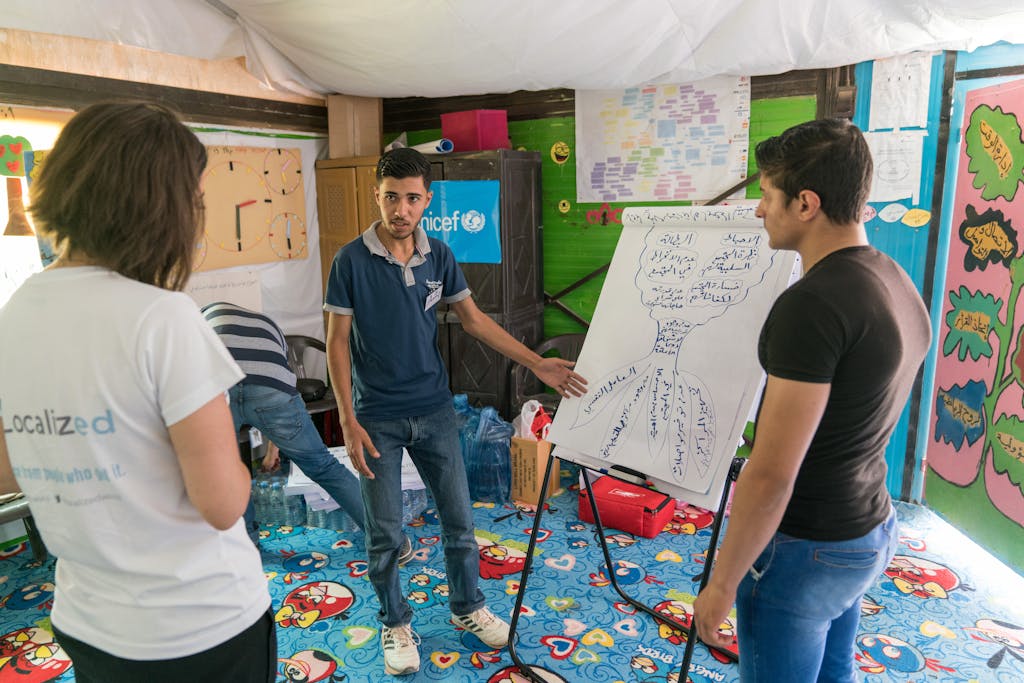In a remote town in Ethiopia, a health worker learns lifesaving midwife tips from a WiFi-enabled tablet linked to a projector.
In the Za’atari refugee camp in Jordan, displaced Syrian engineers help run a giant solar plant so families can cook, study, and work.
In Kampala, Uganda, a team of analysts uses artificial intelligence to study public radio broadcasts and learn what marginalized communities really worry about.
These stories span issues and geographies, yet they share a common thread: They are stories of how the United Nations is innovating to improve lives on the ground.
Innovation doesn’t only live in Silicon Valley, but in communities, companies, and entrepreneurs around the world who are continuously creating new technologies, new partnerships, and new ways of working. Well, so it is with the UN. Throughout the organization and its agencies, innovation is thriving – and helping the UN, its partners, and member countries solve global problems and support people everywhere to create the future they want.
Whatever you thought you thought about the United Nations, think again: This is not your grandparents’ UN; it’s a UN for the 21st century.
Innovators are hard at work in every part of the UN. There’s even a group of them, called the UN Innovation Network, with more than 1,000 members across 74 countries that are developing, trialing, and implementing ideas ranging from high-tech solutions like drones that supply vaccines to new partnerships and processes like working with local farmers to improve school feeding programs.

This group, working to learn from one another, share successes and challenges, and build a more effective UN, is a microcosm of a larger effort underway across the UN system to reform and modernize in order to ensure that the institution is prepared for both the challenges and opportunities of the future.
In the coming months, in our new series, “Innovation in Action,” we will share stories of how the UN is working with partners to pilot, test, and scale new ideas and new ways of working to deliver better results for people around the world.
If we are going to achieve the Sustainable Development Goals, we need to do more, but it can’t just be more of the same. We need to do things better and differently. UN Secretary-General António Guterres recognizes that innovation is a necessity to drive global progress and tackle urgent problems, and he’s led the organization through a bold series of reforms so it is well-placed to address the challenges of today and tomorrow.
At the same time, he is kick-starting a conversation on how to mitigate the risks – and equitably seize the opportunities – of rapid technological advances through a high-level panel on digital cooperation, chaired by online entrepreneur Jack Ma and leading philanthropist Melinda Gates. And through his “Strategy on New Technologies,” the Secretary-General is fostering a UN culture that is committed to learning, innovation, and ambition, while still staying anchored in the values enshrined in the UN Charter, which will mark its 75th anniversary next year. The UN’s embrace of innovation is as much about delivering for people now as it is about preparing the organization for the next 75 years and beyond.
The UN knows that solving the world’s most pressing challenges, from climate change to the evolving nature of work, requires collective action and fresh thinking. From applying artificial intelligence in Uganda, to harnessing refugees’ skills in Jordan, to giving midwives up-to-date lifesaving training in Ethiopia, the “Innovation in Action” stories will explore how the UN is transforming to become more efficient and effective, and by doing so, improving more lives.
We express our gratitude to the UN Innovation Network and the UN’s agencies for sharing their stories with us and for their transformative work. Visit our “Innovation in Action” page to read the first of these stories and learn more.

